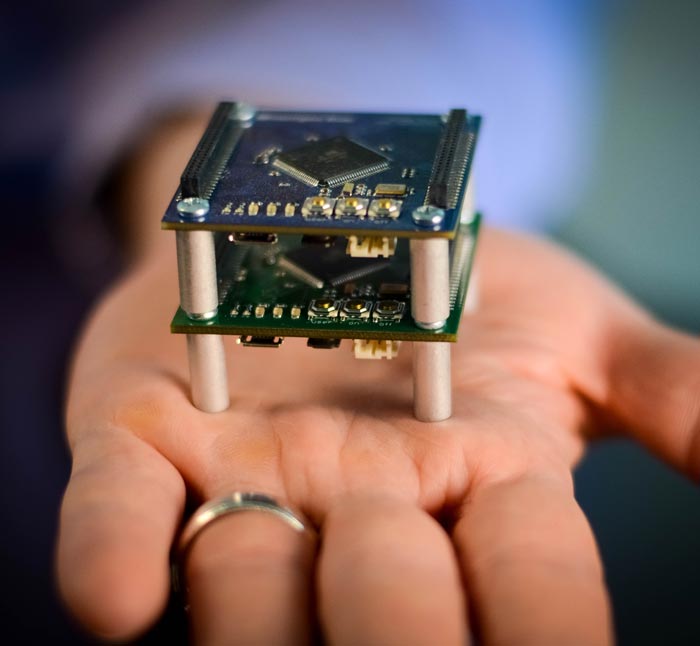
Florida’s New Devices Enhance Monitoring of Sea Level and Water Quality

Florida Atlantic University
Small wireless computing devices developed by Jason Hallstrom, Ph.D. range in size from a matchbox to the size of a dime. This unique device can capture a birds-eye-view of Florida and beyond and will change the way Florida monitors its water quality, sea level rise, hurricanes, agriculture, aquaculture, and even its aging senior population.
Small wireless computing devices, ranging from the size of a matchbox to the size of a dime are going to change the way Florida monitors its water quality, sea level rise, hurricanes, agriculture, aquaculture, and even its aging senior population.
The types of sensing devices developed by computer scientist Jason Hallstrom, Ph.D., who recently joined Florida Atlantic University, can collect information about the surrounding environment and transmit that information to cloud-based computing systems that store, analyze and present that information to educators, researchers and decision-makers. Deployable at massive scales, the technology represents a paradigm shift in how our world is observed and managed.
“This is a thrilling time to join Florida Atlantic University,” said Hallstrom. “The university is on an amazing trajectory, driven by capabilities and opportunities that span every college, at every campus. There is incredible capacity to build interdisciplinary teams here, teams that are going to have a fundamental impact on the state and the nation.”
Hallstrom, a professor in FAU’s College of Engineering and Computer Science, will serve as director of the Institute for Sensing and Embedded Network Systems Engineering at FAU (ISENSE@FAU). ISENSE will serve as an interdisciplinary research hub, drawing talent from both within and outside FAU to tackle grand challenge problems head-on through novel hardware, software and ideas.
“Florida Atlantic University has a unique opportunity to become a clearinghouse for streaming data, to drive big data and data analytics, and to become a major applier of these data streams to fuel research,” said FAU President John Kelly. “Jason is an outstanding addition to our University and his cutting-edge research will bring significant benefits to our state and its citizens.”
Hallstrom is already exploring joint projects with FAU’s Southeast National Marine Renewable Energy Center, Harbor Branch Oceanographic Institute and Charles E. Schmidt College of Medicine. These collaborations will produce new technologies, new ideas and new discoveries that will benefit Florida and its citizens.
“ISENSE@FAU will truly exemplify how interdisciplinary research can bring together faculty, students and staff from across disciplines and campuses to solve complex problems that impact us globally,” said Daniel C. Flynn, Ph.D., vice president for research at FAU, who will oversee the Institute.
Hallstrom’s research is supported by awards from the National Science Foundation, and he is working on the next generation of his water monitoring device, aptly named “Eiffel” to illustrate how this unique device can capture a birds-eye-view of Florida and beyond.
“Applied sensing and the emerging ‘Internet of Things’ provide endless possibilities for making the ‘invisible’ visible, both in the small and in the large,” said Hallstrom. “At FAU, we will be developing technologies for a broad spectrum of applications and uses, ranging from monitoring physiological changes in senior patients to support aging in place, to mitigating natural and manmade disasters, such as hurricanes and biological threats.”
Sensor networks enable applications in monitoring wildfire conditions, locating sniper fire and assessing the structural integrity of buildings and roads. In the event of a manmade or natural disaster, these “sensing fabrics” can be used to provide near instantaneous feedback on the type, degree and location of damage. Emergency management decisions can then be optimized to quickly commit personnel and resources to where they are needed most.
Prior to joining FAU, Hallstrom was associate professor in the Computer Science Division of the School of Computing at Clemson University and served as deputy director and director of technology for Clemson’s Institute of Computational Ecology. Hallstrom spent more than a decade at Clemson and was an integral member of the university-wide research team of river and wetland ecologists, computer engineers, software developers and forestry and natural resource scientists who created an information web to monitor, analyze and report the health of the Savannah River Basin.
Clemson’s Intelligent River® enterprise operates a hydrological observation program that provides real-time monitoring, analysis and management of water resources throughout South Carolina. In his new position at FAU, Hallstrom will continue to lead the technology development efforts for the Intelligent River® program.
About Florida Atlantic University:
Florida Atlantic University, established in 1961, officially opened its doors in 1964 as the fifth public university in Florida. Today, the University, with an annual economic impact of $6.3 billion, serves more than 30,000 undergraduate and graduate students at sites throughout its six-county service region in southeast Florida. FAU’s world-class teaching and research faculty serves students through 10 colleges: the Dorothy F. Schmidt College of Arts and Letters, the College of Business, the College for Design and Social Inquiry, the College of Education, the College of Engineering and Computer Science, the Graduate College, the Harriet L. Wilkes Honors College, the Charles E. Schmidt College of Medicine, the Christine E. Lynn College of Nursing and the Charles E. Schmidt College of Science. FAU is ranked as a High Research Activity institution by the Carnegie Foundation for the Advancement of Teaching. The University is placing special focus on the rapid development of three signature themes – marine and coastal issues, biotechnology and contemporary societal challenges – which provide opportunities for faculty and students to build upon FAU’s existing strengths in research and scholarship.
For more information, visit www.fau.edu
Contact Information
Gisele Galoustian
Media Relations Director, Research
ggaloust@fau.edu
Phone: 561-297-2676
Mobile: 561-985-4615












